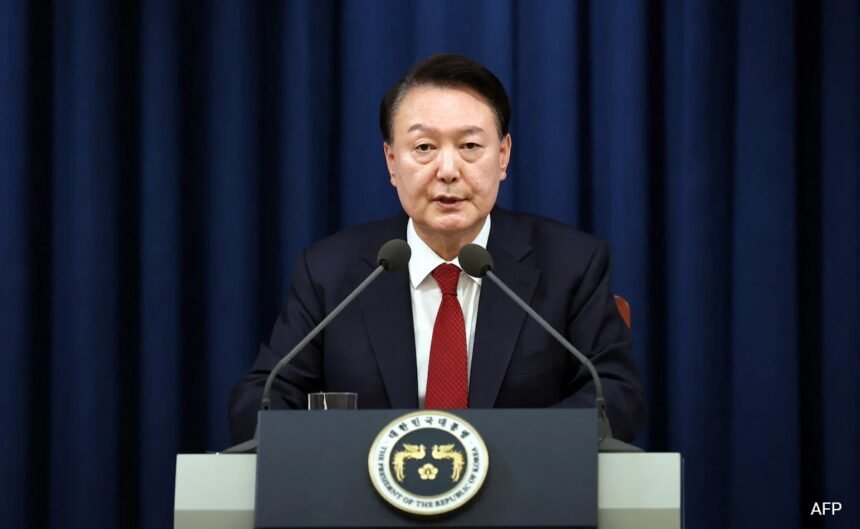On December 16, South Korea’s Constitutional Court began reviewing President Yoon Seok-yeol’s impeachment case. Previously, on December 14, the country’s parliament voted to impeach President Yoon over his decision to impose martial law in the democratic country on December 3.
Soon after Yoon Eun-hye imposed martial law, which lasted only six hours, political unrest broke out across South Korea. Thousands of civilians took to the streets of the capital, Seoul, calling for the president’s removal and arrest. Reports said the protesters chanted slogans, sang, danced and waved K-pop glow sticks.
President Yoon’s shocking martial law order and ensuing political crisis have raised concerns about the country’s economy. The world was taken aback and worried about South Korea’s ability to deter a nuclear-armed North Korea, which is always up to mischief.
a long process
Yoon was forced to lift martial law after parliament collectively called on him to do so, as the declaration disrupted diplomacy and roiled financial markets.
After martial law was imposed, Yoon sent troops and police to parliament in an attempt to block a parliamentary vote on the decree, but withdrew when parliament vetoed it.
After Yin refused to resign, the impeachment motion passed the National Assembly with a vote of 204 to 85, including 12 lawmakers from the ruling and opposition parties. Yoon is now officially suspended, with Prime Minister Han Deok-soo serving as acting president.
In the interim, Yin has been banned from traveling abroad and has been charged with multiple investigations, including possible charges of leading a rebellion – a crime punishable by life imprisonment or even death.
The Constitutional Court will now decide Yoon Eun-hye’s future and has up to six months (180 days) to rule on impeachment. The court will hold its first public hearing on December 27.
If the Constitutional Court rules in favor of impeachment, Yoon Eun-hye will be removed from office and a national election must be held within 60 days to choose his successor.
“There are nine judges in the Constitutional Court, but there are only six judges. Therefore, these six members must unanimously approve or support the impeachment motion passed by the National Assembly. Even if one Constitutional Court judge rejects it, President Yoon will continue to do so.
This is the third time South Korean lawmakers have voted to impeach a president. The first impeachment took place in March 2004, when human rights lawyer-turned-politician Roh Moo-hyun was impeached. However, his impeachment was eventually overturned by the Constitutional Court, and Roh was reinstated as president two months later.
The second impeachment occurred in December 2016. Park Geun-hye, South Korea’s first female president, was impeached due to a corruption scandal. She was dismissed three months later as the Constitutional Court upheld parliament’s decision.
However, this is the first time a South Korean president has declared martial law since South Korea ended its military dictatorship in the late 1980s. “The imposition of martial law has set back South Korea’s democratic image. It has also affected Seoul’s international standing as a stable democratic power known for its transparent political system.
What’s next?
The world remains confused as to what compelled Yoon to impose martial law. Yoon, a conservative, narrowly won the 2022 presidential election and needs the support of Congress where the opposition Democratic Party holds a majority.
“Yin’s party suffered a crushing defeat in the parliamentary elections earlier this year. As a result, there was a kind of paralysis in administration and governance. The president’s huge budget was not passed and his appointments were not approved by the National Assembly,” Amb said. Taiyal. He added: “It could be argued that he imposed this martial law out of frustration, or anger, without consulting or having full confidence in his cabinet or his party.”
A majority of South Koreans support impeaching Yoon for declaring martial law, according to local surveys. The conservative president’s support base is largely among older people, some of whom have staged counter-protests over the past week.
Political uncertainty also raises concerns about economic and market instability. South Korea’s hard-won global reputation as a soft power and mature democracy may face continued damage. “As an industrial economy, political stability is crucial for South Korea as it continues to face greater economic competition from other economies in the region, such as China and Japan,” Mr. Panda said.
The world is dismayed by the unfortunate events in South Korea, and Yoon is uncertain about his future after refusing to resign. Japanese Prime Minister Shigeru Ishiba said he has not yet decided whether to postpone his planned visit to South Korea in January to meet with President Yoon. Japan has long supported closer security ties with South Korea to address challenges posed by China and North Korea.
The United States, one of South Korea’s closest allies, postponed a high-level meeting among military officials to discuss nuclear deterrence. Swedish Prime Minister Kristersson also postponed a planned visit.
North Korea, the nuclear-armed neighbor formally at war with South Korea, remained silent for six days after declaring martial law. North Korean state media highlighted the “mistakes and authoritarian tendencies of South Korea’s leaders” and the people’s opposition. So, can North Korea take advantage of the crisis now?
“To some extent, political instability and chaos in South Korea will strengthen Kim Jong Un and his style of conduct in North Korea. This is also an opportune time for Kim Jong Un to execute sharp diplomacy and strike a direct conversation with President-elect Donald Trump of the US on the Korean Peninsula, taking advantage of the situation when South Korea is not politically united and stable,” says Mao Xiong.
However, unlike North Korea, the massive opposition to President Yoon’s martial law order demonstrates the democratic resilience of South Korea’s institutions and political culture.
(The author is NDTV Consulting Editor)
Disclaimer: The above content represents only the author’s personal views
